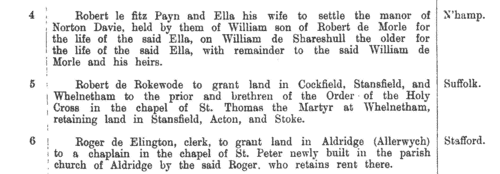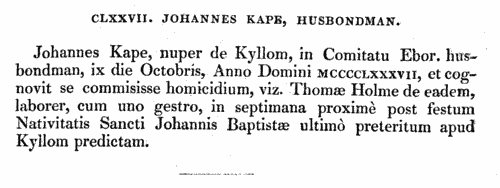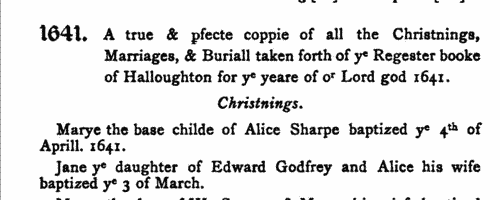Yerburgh Surname Ancestry ResultsOur indexes 1000-1999 include entries for the spelling 'yerburgh'. In the period you have requested, we have the following 45 records (displaying 1 to 10): Single Surname Subscription | | | Buying all 45 results of this search individually would cost £210.00. But you can have free access to all 45 records for a year, to view, to save and print, for £100. Save £110.00. More... |
These sample scans are from the original record. You will get scans of the full pages or articles where the surname you searched for has been found. Your web browser may prevent the sample windows from opening; in this case please change your browser settings to allow pop-up windows from this site. Fine Rolls
(1377-1383)
The fine rolls of the 1st to 6th years of the reign of king Richard II record part of the government administration in England, with orders sent out day by day to individual officers, and commitment of particular responsibilities and duties. There is also some material relating to Wales, Scotland, Ireland and the English possessions in France. YERBURGH. Cost: £4.00.  | Sample scan, click to enlarge

| Close Rolls
(1429-1435)
The close rolls of the 8th to 13th years of the reign of king Henry VI record the main artery of government administration in England, the orders sent out day by day to individual officers, especially sheriffs of shires: they are an exceptionally rich source for so early a period. There is also some material relating to Wales, Scotland, Ireland and the English possessions in France. Also included is the Exchange Roll of 1424 to 1434, of licences to transmit sums of money out of the realm.YERBURGH. Cost: £4.00.  | Sample scan, click to enlarge

| Landowners and tenants in Lincolnshire
(1345-1485)
Inquisitions ad quod damnum were held by the appropriate sheriff or escheator (or other officer in whose bailiwick the matter in question might lie) to investigate cases in which the royal or public interest might be damaged by proposed alienation or settlement of land (especially alienation to religious uses, into mortmain). The key findings from these inquisitions were as to the tenure of the land and the service due from it; its yearly value; the lands remaining to the grantor, and whether they sufficed to discharge all duties and customs due from him; and whether he can still be put upon juries, assizes and recognitions, so that the country be not burdened by his withdrawal from them. Generally speaking, this process had the makings of a system of licensing such alienations, and raising money in proportion to the valuations. Equally, there are many items that deal with subjects such as the closing of public roads, the felling or inclosing of woods, or the proposed grant of liberties or immunities. A calendar of these inquisitions from the 19th year of the reign of king Edward III to the 2nd year of Richard III was prepared by the Public Record Office and published in 1906. We have now indexed this calendar by surname and county. Most of the individuals appearing in the calendar are either pious individuals seeking to make grants to religious bodies for the sake of their souls; or landowners securing the disposition and settling of their real estate. But some other names do appear - tenants, trustees, chaplains and clerks.YERBURGH. Cost: £6.00.  | Sample scan, click to enlarge

| Murderers sheltering in Beverley Minster: and their victims
(1478-1539)
Criminals could evade pursuit by claiming sanctuary in the church of St John in Beverley, in the East Riding of Yorkshire. This liberty of the minster extended a league in every direction from the church door, and was divided into six sections, each giving greater sanctity to the rights of sanctuary, the sixth and innermost section being the presbitery or chancel. Near the altar there was a stone chair called the Frith Stool, seated on which an accused could claim total immunity. The bailiff would receive the oath of the fugitive, and a clerk recorded 'what man he killed, and wher with, and both ther namez'; the bailiff receiving a fee of 2s 4d, the clerk 4d. Sanctuary was afforded for 30 days, with food and lodging, after which the fugitive was protected to the borders of the county. But within 40 days he had to appear before the coroner, clothed in sackcloth, and be branded on his right hand with the sign of the letter A. This signified that he was swearing to abjure the realm: he was then free to leave the country unhindered. At Beverley the clerks kept a separate register of fugitives' petitions, which survives from 1478 to 1539 in Harleian Manuscript 560. It was edited and printed by the Surtees Society in 1837 under the title Sanctuarium Beverlacense. Some of the criminals came from a considerable distance: the great majority were murderers or homicides. Each entry usually gives full name, original address, (often) trade, a brief description of the crime, often with date, and usually the name of the victim. This index covers all the surnames given.YERBURGH. Cost: £4.00.  | Sample scan, click to enlarge

| Southwell Peculiar Baptisms, Marriages and Burials
(1614-1641)
Each year a copy of the previous year's register of baptisms, marriages and burials, attested by the incumbent and churchwardens, was returned to the diocesan authorities. The peculiar of Southwell in Nottinghamshire was ordinarily exempt from episcopal jurisdiction in such matters, and the 24 parishes in the peculiar made similar returns to the Southwell registry. A few of these survive from this period, and they were transcribed by T. N. Blagg and printed as the first volume of the Record Series of the Thoroton Society in 1903. The returns are for Beckingham 1634, 1637, 1641; Bleasby 1633; Blidworth 1638; Calverton 1617, 1623; *Caunton 1614, 1619, 1628, 1641; Cropwell Bishop 1638, 164; Darlton 1622, 1633, 1641; *Dunham 1641; Edingley 1638; Farnsfield 1623; Halam 1622, 1637; Halloughton 1622, 1637; *Holme 1623, 1625, 1627, 1638, 1641; Kirklington 1622, 1638; *Morton 1622, 1623; *North Muskham 1623, 1633, 1638; South Muskham 1623; *Norwell 1638, 1641; Oxton 1622; *Ragnall 1623; Southwell 1633, 1640; Tithby (cum Cropwell Butler) 1625; Upton 1633, 1638; and Woodborough 1623, 1627, 1637, 1638 and 1640. Parishes marked with an asterisk (*) are those for which the original registers were missing for the period covered by the transcripts.YERBURGH. Cost: £4.00.  | Sample scan, click to enlarge

| Official Papers
(1655-1656)
The State Papers Domestic cover all manner of business relating to Britain, Ireland and the colonies, conducted in the office of the Secretary of State as well as other miscellaneous records. These records are from November 1655 to June 1656: there is also a set of abstracts of navy correspondence.
YERBURGH. Cost: £4.00.  | Sample scan, click to enlarge

| London Marriage Allegations
(1611-1660)
London, Essex and part of Hertfordshire lay within the diocese of London. In the later 17th century the individual archdeaconry courts issued marriage licences, but for this period the only surviving material is from the overarching London Consistory court. The main series of marriage allegations from the consistory court was extracted by Colonel Joseph Lemuel Chester, and the text was edited by George J. Armytage and published by the Harleian Society in 1887. A typical later entry will give date; name, address and occupation of groom; name, address and condition of his intended bride, and/or, where she is a spinster, her father's name, address and occupation. Lastly we have the name of the church where the wedding was going to take place. For the later years Colonel Chester merely picked out items that he thought were of interest, and his selections continue as late as 1828, but the bulk of the licences abstracted here are from the 17th century.YERBURGH. Cost: £4.00.  | Sample scan, click to enlarge

|  Masters and Apprentices
(1737) Masters and Apprentices
(1737)
Apprenticeship indentures and clerks' articles were subject to a 6d or 12d per pound stamp duty: the registers of the payments usually give the master's trade, address, and occupation, and the apprentice's father's name and address, as well as details of the date and length of the apprenticeship. 1 January to 31 December 1737YERBURGH. Cost: £8.00.  | Sample scan, click to enlarge

|  Masters of apprentices registered in Lincolnshire
(1775) Masters of apprentices registered in Lincolnshire
(1775)
Apprenticeship indentures and clerks' articles were subject to a 6d or 12d per pound stamp duty: the registers of the payments usually give the master's trade, address, and occupation, and the apprentice's name, as well as details of the date and length of the apprenticeship. There are central registers for collections of the stamp duty in London, as well as returns from collectors in the provinces. These collectors generally received duty just from their own county, but sometimes from further afield. The indentures themselves can date from a year or two earlier than this return. (The sample entry shown on this scan is taken from a Bristol return. Each entry has two scans, the other being the facing page with the details of the indenture, length of service, and payment of duty.) IR 1/59YERBURGH. Cost: £8.00.  | Sample scan, click to enlarge

|  Clerks and apprentices
(1781) Clerks and apprentices
(1781)
Apprenticeship indentures and clerks' articles were subject to a 6d or 12d per pound stamp duty: the registers of the payments usually give the master's trade, address, and occupation, and the apprentice's name, as well as details of the date and length of the apprenticeship. 16 January to 31 December 1781. IR 1/31YERBURGH. Cost: £8.00.  | Sample scan, click to enlarge

|
Research your ancestry, family history, genealogy and one-name study by direct access to original records and archives indexed by surname.
|













